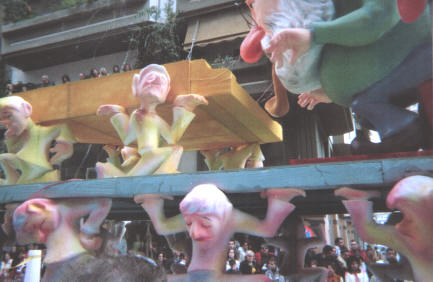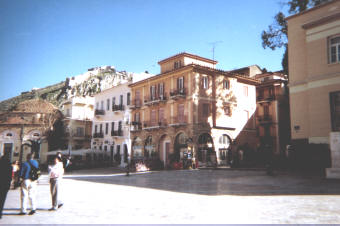Greek Week
part
two
back to part one
on to part three
It is only our second full day in Greece, and already we have been through Athens, Delfi, and Messolongi, given a concert, seen legendary ruins, been to a museum, a garden, and a couple of nice restaurants, been feted by city officials, blown away by the sea and the mountains, and consumed large quantities of feta cheese. I wasn't sure at first but I'm beginning to like the stuff.
Today we are in Patras, in the northwest corner of the islandlike portion of Greece, known as Peloponnese. Patras isn't widely considered one of the more interesting spots for tourists in Greece, but we have arrived just days before the start of the Lenten season by the Greek Orthodox calendar. It begins Monday, and today is Saturday, which means one thing: Carnival! If this seems reminiscent of New Orleans and Mardi-Gras, Greek style, I am afraid I was expecting that too, and wondering just how prudent it was to be wandering into such a thing with two dozen teenage girls.
Fortunately, the most inebriated hijinx were kept to a minimum. I was told by some that it is because the Greeks are a little more reserved; a more reasonable explanation perhaps is that it was pretty chilly that afternoon so the clothing didn't come off; anyhow, we cleared out before evening, when things usually tend to really get going, no matter where you are from.
| Before experiencing the Carnival, we stopped at St. Andrew's
church, a very ornate building which is said to house the skull of Saint
Andrew. No borrowed finery here! We trooped in to see the skull and marvel
at the murals on the walls and the decorative metallurgy everywhere. The
sanctuary is one of those places where, at least until recently (and I'm not
sure if it is even allowed now during services) women were forbidden to enter. Our tour
group of mostly girls got to take sweet revenge on that patriarchal decree;
it wouldn't be the last time.
Given the afternoon off, we splintered into groups to enjoy the parade which was to take place a couple of bocks over. Already you could see parade floats lining up near the church and people in colorful costumes taking their place in the parade. |
|
Once the parade kicked off, there was little to be done but gaze at the imaginative productions of the participants. The music blared; we were pretty much sandwiched in although we'd managed to get pretty good places near the edge of the sidewalk; apparently the event wasn't as well attended as usual.
|
|
|
|
It was good to get a taste of modern Greece. A day later, we were back among the ruins of ancient Olympia, the site of those famed athletic contests. The village is now mostly impressive-looking rubble; even that was buried beneath layers of sediment and was dug out by teams of Germans, who seem to have taken quite an interest in ancient Greece during the 19th century, particularly a man named Heinrich Schliemann. The Greeks built things to last; however, their temples were not earthquake-proof, as the Temple of Zeus (top left in the pictures below) shows. The one visible column is a reconstruction, rather than an unusually lucky pillar.
The Olympic village was a self-contained city of sorts--athletes who were to participate in the games went to live in the Olympic village and train with the other athletes--the very ones they were later to compete against. They stayed in the Olympic hotel (bottom right); I told a few people after my return that that was "the hotel" and watched their reaction, before hastily explaining that we stayed at a different one. It was a bad joke. This hotel, too, was apparently a model of elegance, if that adjective applies to stone structures. It certainly seems to, at least to judge from the model of what the hotel looked like when it was open for business.
Past the temples to Zeus and Hera (hers is always a little bit smaller, you know?) is the place where today the Olympic torch is lit before it makes its long journey to wherever the Olympic games are being held (top right). Then there is a tunnel, a small archway, and you are standing in the ancient stadium, surrounded by cheering ghosts! The Greeks didn't countenance cheating at their games, which is why, on the way to the stadium, there once was a hall of shame--statues of all those athletes who had cheated at the games. They didn't fool around with five-game suspensions and other slaps on the wrist back then. Now it is only a memory--the archway is the only stone reminder of past glory. Little remains inside the stadium (bottom left) except the starting line for the races, which was naturally built of marble. The girls lined up on it and ran a race the length of the stadium. I don't recall who won, but we kidded her afterward saying we saw her cheat and her statue would be going up shortly!
It was time to travel to Tolo, a lovely resort town on the eastern coast of Peloponnese. Even judging by the map it was going to take a long bus ride to get there. I quipped, "it may be a long way to Tripoli, (which happens to be in central Greece) but it is even longer to Tolo." Nevertheless, as you can see by the pictures, it was certainly worth it. The back of the hotel provided an excellent view of the sea (below). For some reason now, when I think of our accommodations, I immediately think of Tolo. I will always remember the recalcitrant door handle on the hotel room. Similarly, who can forget our very friendly hotel dog, who followed us leisurely about the grounds. One night I saw Alice eating an orange. I have never seen a human being enjoy a piece of fruit so much. Greek oranges are, believe it or not, the number one export. If you have had one, you are not the same individual you once were. Trust me; after the testimonial I had the experience myself. It would be worth the plane trip just to eat an orange and go home. But while you are there anyway....
|
|
In the nearby town of Navplion, we gave
our second concert. It was in a lovely church, with the acoustics of a large
bathtub, which made the girls' accapella singing sound really wonderful. It
was not much help for the piano, however, since even the quietest sounds
needed about three seconds to die away. I have played a few concerts in
"bathtubs" before, but it still takes a little adjustment.
I should probably mention at this juncture, for comic purposes anyway, that since the girls had basically taken over the building, for changing purposes, my page turner and I had no small difficulty getting prepared in time for the concert, which, as usual, started late enough not to matter, although the cramped quarters of my stall probably would have been an inspiration to a soul like Charlie Chaplin, who could have made a movie about it. There we will let the matter rest. |
| The concert was lovely. Apparently, some of it was on Greek television, since there was a small crew there interviewing Tassos when I got to the hall, and later, during the concert, in fact, a cameraman spent some time wandering in and out of the stage area, nearly crashing into Alice while she was conducting at one point. But the sound man put it best--despite the uselessness of putting microphones in front of the choir in such a venue where the sound would carry to all quarters quite well on its own (and even, we heard later, to the square outside, courtesy of an open door, which drew more people in to hear us), there they were (a symptom of the age, perhaps) and we had a technical guru to run it all smoothly. He seemed increasingly impressed with the concert as it went along, and at the final piece's conclusion, in the silence that followed the last cutoff, before anyone had time to react with applause, he said audibly in English, "Wow!" We were considering having that sentiment leading the playbill at the next concert. Who cares what the Times wrote when you have such an unforced enthusiastic response from a sound guy in Greece! |
|
....on to the rousing conclusion (part three)

